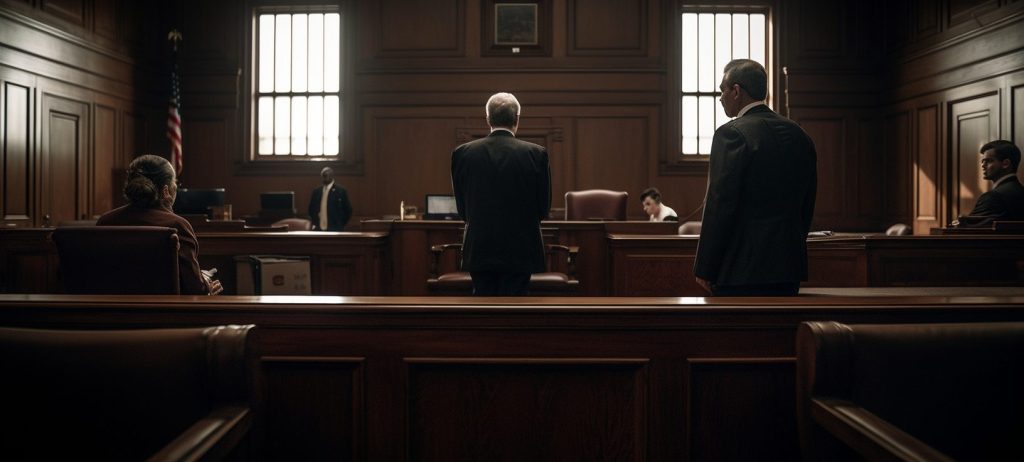Powerful help for when final wishes aren’t respected
The executor isn’t following the will. The trustee won’t tell anybody where the money went. A medical worker got added to the will out of nowhere. An in-law is threatening to sue for more money.
Sometimes people just seem to go crazy when there’s assets left after the death of a loved one. We’ve seen it before. When disputes over wills or trusts become more than just a heated argument, we can provide powerful legal solutions within the court system.

Estate Litigation Service: Removal of Executors or Trustees
Removing an executor (for wills) or a trustee (for trusts) is a serious action often initiated when beneficiaries believe the appointed individual is not fulfilling their responsibilities adequately. Removal is an involved but relatively quick process where probate attorneys must prove the personal representative is unfit for the position.
Possible qualifications for being deemed unfit to act as executor or trustee:
- Breach of Fiduciary Duty: When someone is appointed as an executor of an estate or a trustee of a trust, they assume a fiduciary role, meaning they are legally obligated to act in the best interest of the estate itself – not their own interests! Breach of this duty carries severe legal ramifications. When they fail in their duties probate and trust dispute attorneys can help the beneficiaries hold the executor or trustee accountable.
- Incompetence: If the executor or trustee lacks the capability to perform their duties due to mental incapacity or profound ignorance regarding their responsibilities.
- Negligence: A failure to act diligently or timely, like not distributing assets within a reasonable period.
- Conflict of Interest: Situations where their personal interests are in direct conflict with their fiduciary duties.
- Misappropriation of Funds: Using estate or trust assets for personal gain.
Typical steps for removing an executor or trustee:
- Initial Concerns Raised: Beneficiaries identify potential issues with the executor or trustee.
- Consultation with Legal Counsel: Beneficiaries consult with an attorney to assess the situation and learn about the removal process.
- Petition for Removal: A formal request is submitted to the relevant court detailing the grounds for removal.
- Notice & Hearing: The executor or trustee is notified of the petition. A court hearing is scheduled where both sides present their case.
- Court Decision: Depending on the evidence and jurisdiction, the court will decide to retain, replace, or temporarily suspend the executor or trustee.
- Appointment of Successor: If removal is granted, the court appoints a successor to take over responsibilities for the effected estate or trust.
The process can range from a few weeks to several months, depending on the complexity of the issues, the court’s schedule, and the willingness of the trustee/executor to stand down.
Here are some common ways that we have seen people fail to act in the interests of the estate.
Mismanagement of Assets: Whether dealing with estates or trusts, fiduciaries are responsible for appropriately handling, preserving, and investing assets. Mismanagement could include failure to pay taxes, poor investment choices, or neglecting to maintain property, leading to a loss in value. When assets are squandered or diminished whether that is due to negligence or incompetence, it constitutes a breach.
Self-dealing: This refers to situations where fiduciaries prioritize their personal interests over their duties. For instance, if a trustee sells an asset from the trust to themselves at a price below market value, they do so at the expense of the beneficiaries.
Other Forms of Misconduct: Other violations include failing to follow the terms of a will or trust, showing favoritism among beneficiaries, or embezzling funds. Such misconduct undermines the purpose of the estate or trust and ultimately harms the beneficiaries.
Beneficiaries can legally challenge the executor or trustee for breach of fiduciary duty. This can potentially lead to their removal, restitution, or other remedies. If you need help getting rid of a bad executor or trustee, call us today.
Probate and Trust Dispute Service: Will and Trust Contestation
These are among the most common probate litigation services. If someone believes a will or trust is not valid, they can challenge it. Our lawyers assist clients in challenging and defending the validity of both.
Some quick terms:
- Testator: An individual who creates and signs a will.
- Trustor: An individual or group that creates a trust.
- Testamentary Document: A written expression of a person’s intentions. These can take the form of a last will and testament, a living will, or a holographic will.
- Trust Instrument: A document (including amendments) that contains the terms for operating and managing a trust.
Contesting a will or trust involves legally challenging the validity of these documents on specific grounds. Though there are numerous reasons to contest trusts and wills, these are the main three: undue influence, lack of capacity, and fraud.

Undue Influence
This occurs when the testator/trustor is pressured or coerced into making provisions they would not have made under normal circumstances. The common example of this is when a caretaker exercises their position of influence to get their patient to make changes to their will.
Evidence: To prove undue influence, one might present evidence of a vulnerable testator/trustor, an unusual or unexpected beneficiary, or a history of manipulative behavior by a person close to the testator.
Defense: If defending against this claim, it’s crucial to show that the individual acted of their own free will. Witnesses, written correspondence, and evidence of independent legal advice can be valuable in proving no undue influence was exerted.
Lack of Capacity
For a will or trust to be valid, the testator/trustor must have legal capacity, meaning they understand the nature of their actions, the extent of their assets, and the beneficiaries they are appointing. In other words, they have to understand what they are doing when they do it.
Evidence: Medical records, testimony from medical professionals, or accounts of erratic behavior can help establish a lack of capacity.
Defense: If defending a will or trust, presenting contrary medical opinions, testimonies from individuals who interacted with the individual around the time the documents were made, or evidence of logical planning can counter these claims.
Fraud
This pertains to situations where a testator/trustor is deceived or misled, resulting in a will or trust that doesn’t reflect their true intentions.
Evidence: Direct proof of deceit, forged signatures, or testimonies indicating the person was misled can support a claim of fraud.
Defense: Demonstrating the individual’s awareness and intention can defend against fraud allegations. This might include video footage of the document signing, witness testimonies, or proof of the testator/trustor’s familiarity with the document’s contents.
Strategies for Contesting vs. Defending a Will or Trust:
Contesting a will or trust
Gather Comprehensive Evidence: Ensure you have all relevant documents, testimonies, and any other evidence supporting your claim.
Legal Expertise: Engage a probate litigation attorney experienced in contesting wills and trusts.
Mediation: Before pursuing court action, consider mediation. It can be a less adversarial and cost-effective way to resolve disputes.
Defending a will or trust
Anticipate Challenges: Understand common grounds for contestation and be prepared to counter them.
Preserve Records: Documentation showing the testator/trustor’s intent, awareness, and mental state can be pivotal.
Expert Witnesses: Enlist professionals, like doctors or solicitors, who can testify regarding legal capacity and intention.
In either scenario, gathering and presenting the specifics of the situation, the grounds for contestation, and the available evidence is how you win. The guidance of experienced estate litigation attorneys can significantly impact the outcome of the process.

Probate and Trust Dispute Service: Interpretation Disputes
In the realm of probate law, the precise wording and phrasing of testamentary documents and trust instruments hold immense significance. However, there are instances when the language used in these documents is ambiguous, unclear, or open to multiple interpretations. This can lead to interpretation disputes, which arise when parties disagree on the true intent or meaning of specific provisions in the will or trust. Your estate litigation lawyers assist in clarifying the testator or trustor’s intent and ensuring that provisions are carried out as intended.
Preserving Intent: The primary objective of probate law is to ensure that the deceased’s wishes are honored. Interpretation disputes aim to ascertain and uphold the testator/trustor’s actual intent, especially when language is open-ended or vague.
Beneficiary Rights: Ambiguous wording can affect the rights and entitlements of beneficiaries. Resolving such disputes ensures that beneficiaries receive what was intended for them.
Preventing Litigation: By addressing and resolving interpretation disputes early on, lengthy and expensive legal battles can often be avoided. Courts, in many cases, prefer mediation or other alternative dispute resolution methods before resorting to litigation.
Guidance for Future Drafting: Resolutions of interpretation disputes often influence how attorneys draft future documents, emphasizing clarity and precision to prevent similar issues.
In essence, interpretation disputes play a critical role in ensuring that testamentary documents and trust instruments are implemented as intended, protecting the rights of beneficiaries and maintaining the integrity of the probate process.

Probate and Trust Dispute Service: Recovery of Assets
Imagine a brother who’s been living it up in the family home without paying a dime. It’s like he’s forgotten that living rent-free actually costs the estate something. It’s an unfortunate situation that happens more than you’d think.
Then, there’s the trustee – think of them as the manager of the estate – who decides to snag a deal on the family home. A sale to themselves, for a price that wouldn’t even buy you a decent car. That’s not just shrewd business; it’s stepping over a line.
If assets were wrongly taken or misappropriated before or after the individual’s death, the executor has the responsibility to take action. This might involve legal proceedings to reclaim assets or ensure they are accounted for correctly. Our lawyers are part detective, part advocate, and all about getting getting things made right. We will look at what’s happened, figure out what should’ve happened, and then lay out your options. We can take stock of the lost rent, the undervalued house sale, the drained bank account, and put a number to it. That’s the first step to getting your assets back.
It’s not just about the money – it’s about respect. It’s about honoring the wishes of those who’ve left us and making sure everyone plays by the rules. So, if you find yourself in a bind where the trust isn’t being trusted, reach out to an estate litigation attorney. They’ll be your guide through the thorny thicket of estate recovery.
Remember, estates and trusts are more than just legal documents—they’re the last word of someone who wanted to look out for their kin.
In essence, estate and trust litigation services offered at Clear Counsel Law Group ensure that the last wishes of the deceased are honored, that the rights of beneficiaries are protected, and that any disputes arising from the execution of a documents are judiciously resolved.